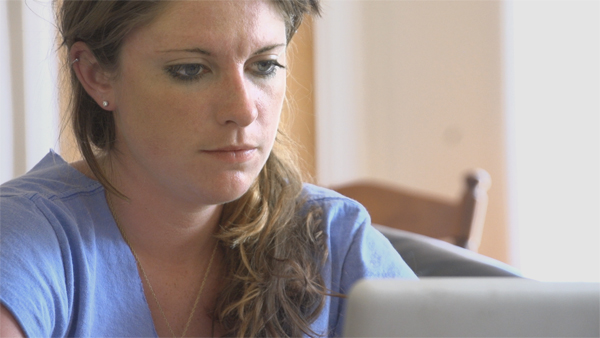The Hunting Ground is an indignant and impassioned documentary that mostly manages to get behind the headlines and ahead of the news. In just over a year of its filming, the issue of sexual assaults on college campuses went from behind dorm room doors to social media outrage to a White House Task Force last month and the Department of Education’s current investigation of almost 100 institutions.
The individual stories of young men and women here are emotional case studies of the quagmire of acquaintance and date rape. They turn their private trauma from the attacks and the stonewalled reactions of their college administrations into public activism and national outreach. (Cecilia Peck’s searing Brave Miss World, from 2013, focused on the impact of acquaintance rape and more generally encouraged victims to come forward to challenge the statistic that only 20 percent of all rapes are reported.)
Director Kirby Dick’s exposé of unpunished sexual assaults in the military, in The Invisible War (2012), brought out victims on campuses asking him for similar attention to their plight. A montage of diverse young women moving into the ivory towers under “Welcome” signs sets up the arc of innocence. Some were proud to be the first in their families to go to college, and others were legacies continuing long alumni traditions.
These sylvan campus scenes—colleges large and small, public and private—each more archetypal than the next, are a running visual theme that turns threatening as the camera returns to the specific locales where students tearfully report where they were assaulted. One admitted rapist, his face blurred, describes his modus operandi, which an interviewed expert says is a typical model of isolating and overpowering the victim.
Kirby targets the colleges’ reactions, from Harvard to Notre Dame, Occidental, Swarthmore, and Yale to universities in California, Florida, North Carolina, and Southern California. The shaken students first describe how they couldn’t even figure out how to report the attack, and then were actively discouraged by college administrators. Have none of the officials watched Law & Order: Sex Victims Unit over the past 15 years and learned to handle rape cases seriously and sensitively? In telling numbers on screen, the few cases adjudicated have resulted in almost laughably less severe punishments than academic crimes like cheating or plagiarism: paper-writing assignments, 50 hours of community service. The film, though, repeats the more publicized stereotypes of drunken fraternities and profitable campus athletes, as seen in well-edited, if familiar, compliations of TV news and headline coverage around the country.
The documentary is strongest in following the grassroots effort started by Annie Clark and Andrea Pino at the University of North Carolina at Chapel Hill when they were first just looking for a way to “shame” the school. They hit on a new legal strategy of applying Title IX’s criteria: a hostile environment undermines an equal education. (Lisa Jackson’s current documentary It Happened Here clarifies the Title IX issues while following student activists in a similar University of Connecticut case.)
While brief footage of “Take Back the Night” demonstrations from the early 1970’s show this is not a new problem, the students prove that what’s needed now is institutional memory to outlast the temporary four-year population that moves on and out (or drops out, as several traumatized victims confess to). They begin to connect with other victims on campus and across the country and discuss how to file complaints and then relentlessly travel to school after school, sometimes sleeping in cars. The women embody the strength of being able to say, “You are not alone.”
The reams of alarming statistics on screen are soberly effective—“Serial predators are responsible for 91 percent of all sexual assaults on campus”—as are the citations of years and years of national studies, whether from advocacy and service organizations like RAINN (Rape, Abuse & Incest National Network), the U.S. Department of Education surveys, or academic research.
Unusually for most documentaries, the experts also claim their personal involvement to champion the victims has negatively affected their academic careers, though they do start sounding like conspiracy theorists, especially in the closing sections that aim at the “American fraternity industry” and sports teams with powerful alumni donors. In addition to rowdy footage of crude chants, one former frat member talks of how the vulgar sexual braggadocio was common, but, unfortunately, he doesn’t sound much different from characters in gross-out college comedies. (Abusers are a small percentage within this verbally aggressive environment.)
The power of athletic departments on college administrators and fervid communities of fans has been well-documented in such films as Amir Bar-Lev’s Happy Valley last year and Ross Finkel, Trevor Martin, and Jonathan Paley’s Schooled: The Price of College Sports (2013). Here, the impunity of the Big Man on Campus in a notorious Florida State case is wrenchingly concentrated on the victim. She and other accusers against athletes wearily and tearfully report being personally slammed with vicious social media trolls and graffiti smears while the players kept playing in games. Perhaps Lady Gaga’s theme song for the film “Till It Happens to You” will help raise consciousness against such reactions.
The contributing factor of alcohol seems to be just considered inevitable, but the big weakness throughout is the lack of a clear explanation of the larger legal and criminal context for pursuing college punishments instead of, or in addition to, outside law enforcement, as well as what rights the accused has in any proceeding. A retired campus officer details his frustration at the lack of administrative support, but the role of campus police in relation to municipal police departments is confusing, though it affects how the institutions have been reporting artificially low crime statistics to the Department of Education. The activists profiled in this film intend to make sure those damning statistics will no longer be lies.







Leave A Comment